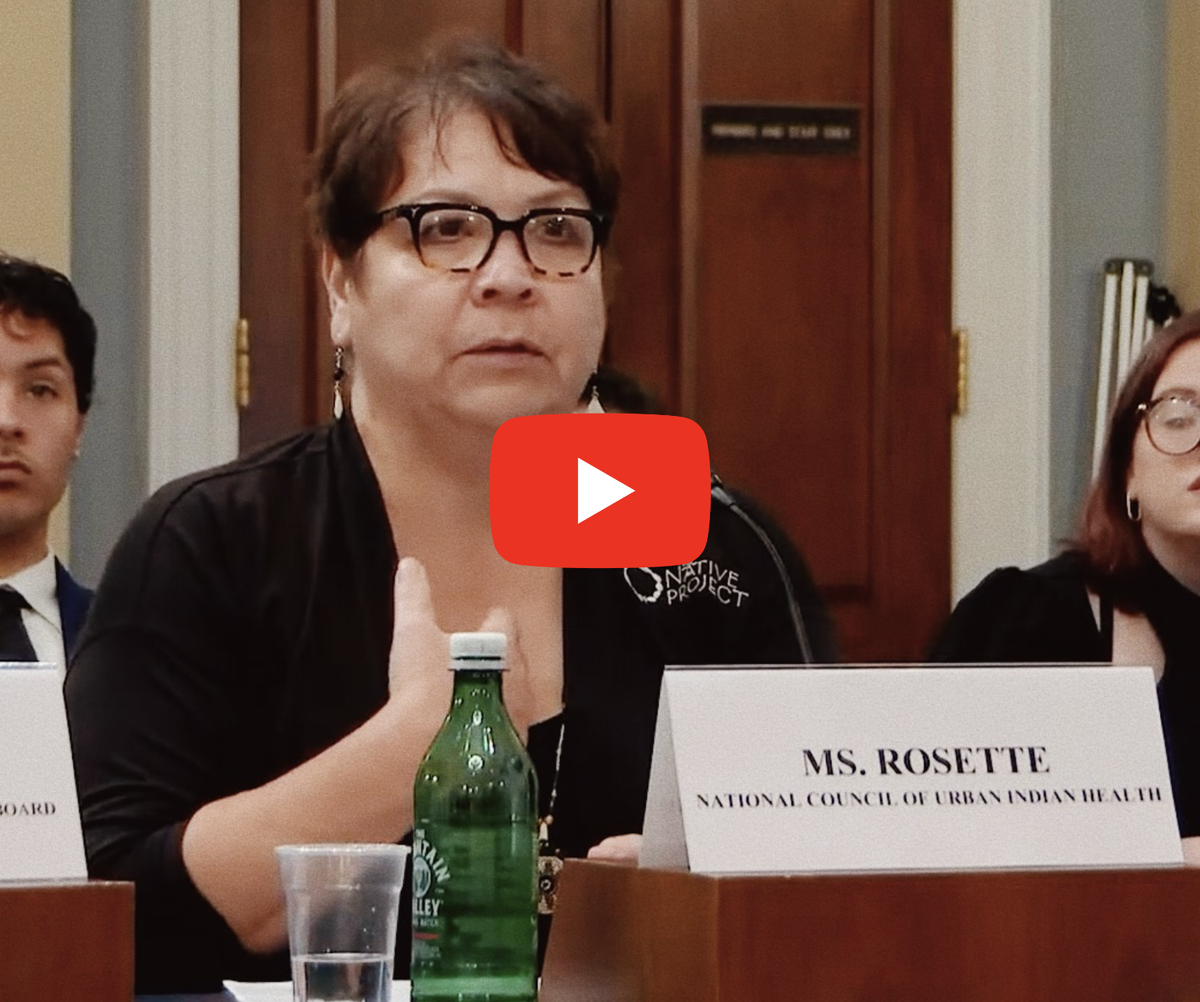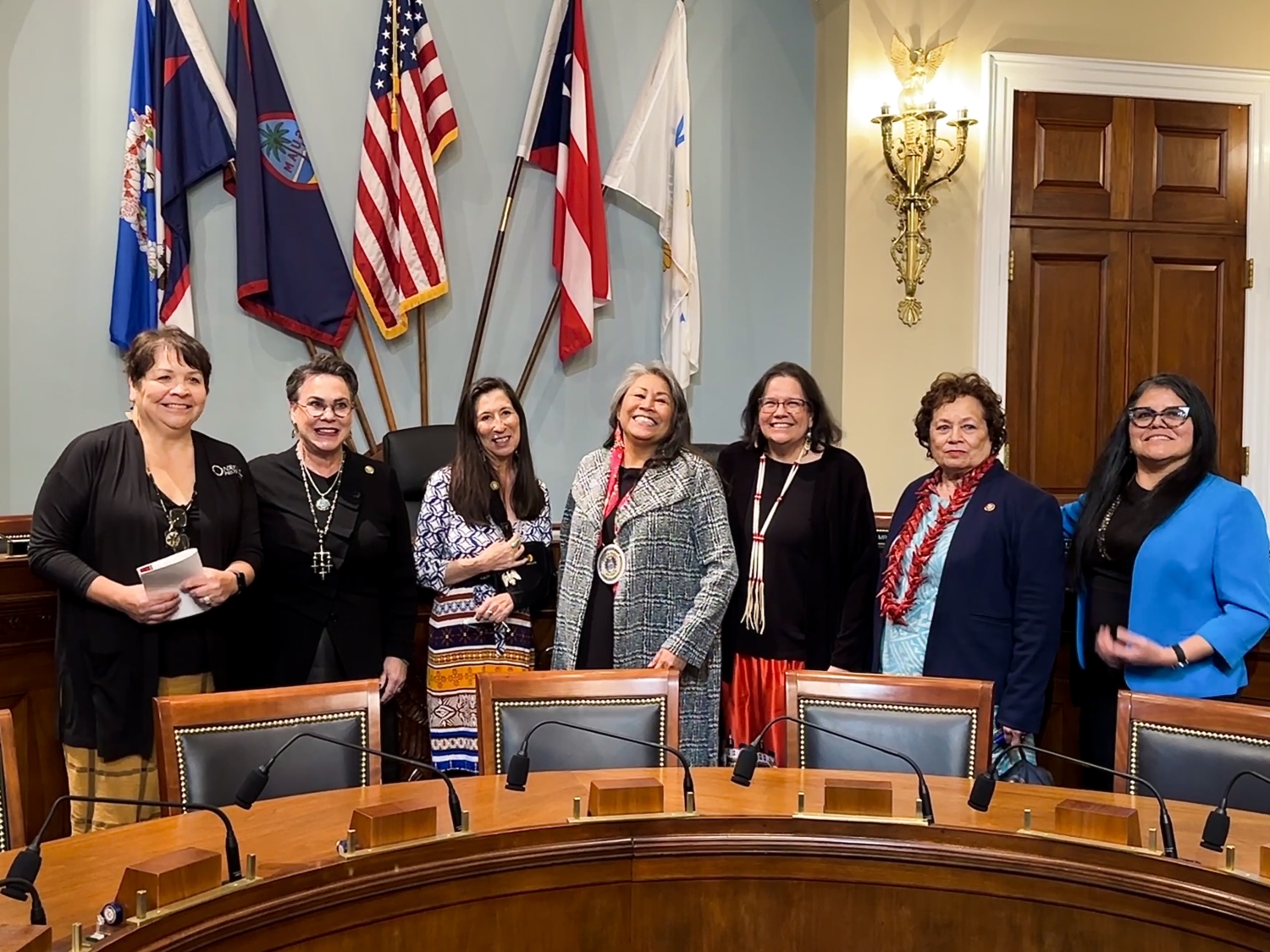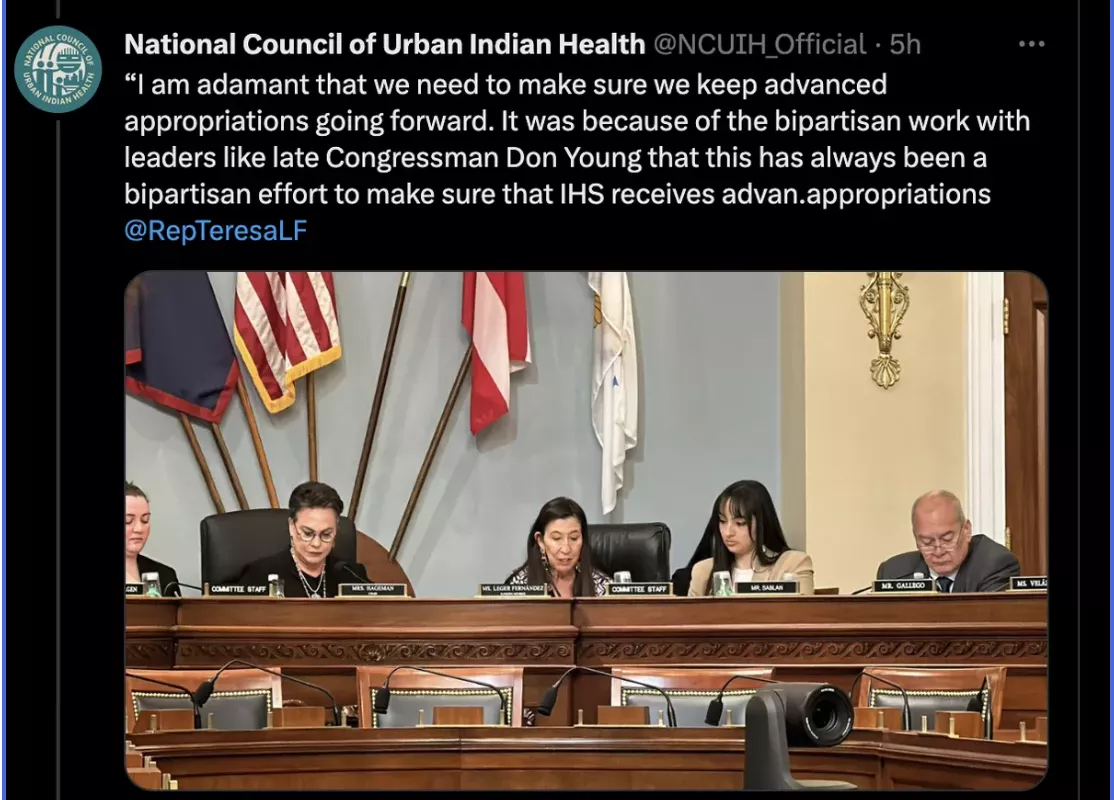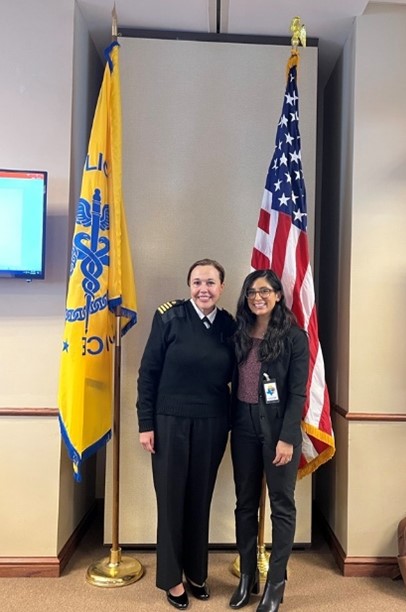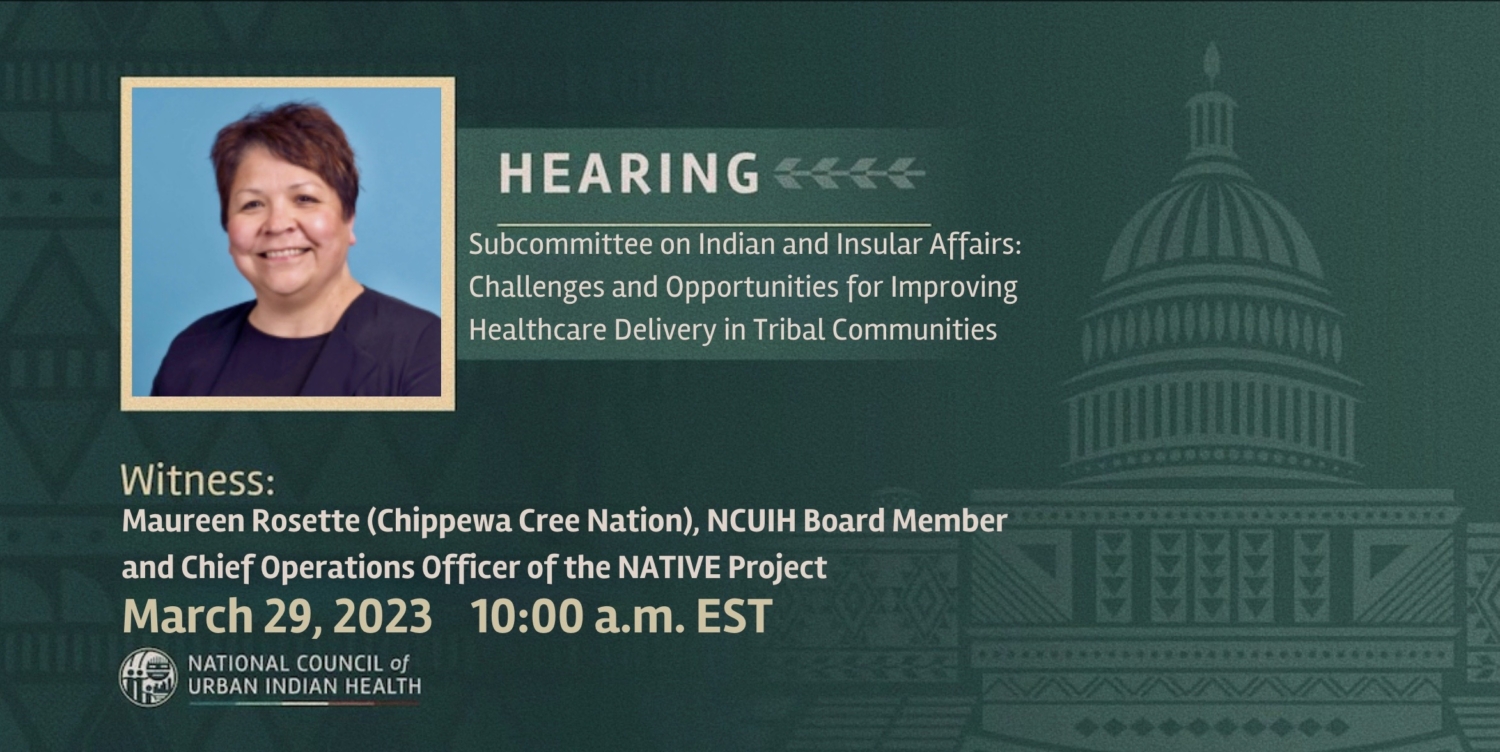On March 23, 2023, The National Council of Urban Indian Health (NCUIH) submitted outside written testimony to the House Appropriations Subcommittee on Labor, Health and Human Services, Education, and Related Agencies regarding Fiscal Year (FY) 2024 funding for Urban Indian Organizations (UIOs). NCUIH advocated in its testimony for full funding for the Indian Health Service (IHS) and urban Indian health and increased resources for Native health programs.
In the testimony, NCUIH requested the following:
- $51.42 billion for the Indian Health Service and $973.59 million for Urban Indian Health for FY24 (as requested by the Tribal Budget Formulation Workgroup)
- Maintain Advance Appropriations for the Indian Health Service until Mandatory Funding is Enacted and protect IHS from sequestration
- Permanent 100% Federal Medical Assistance Percentage for services provided at UIOs
- Increase funding for Electronic Health Record Modernization
- Increase funding to $30 million for Good Health and Wellness in Indian Country (GHWIC)
- Ensure UIOs are appropriately included in grant programs relating to Indian health
- Appropriate $80 million for the Native Behavioral Health Resources Program
- Work with Authorizers to Reauthorize the Special Diabetes Program for Indians
Full Text of Testimony:
My name is Francys Crevier, I am Algonquin and the Chief Executive Officer of the National Council of Urban Indian Health (NCUIH), the national representative of urban Indian organizations receiving grants under Title V of the Indian Health Care Improvement Act (IHCIA) and the American Indians and Alaska Native (AI/ANs) patients they serve. On behalf of NCUIH and these 41 Urban Indian Organizations (UIOs), I would like to thank Chair Aderholt, Ranking Member DeLauro, and Members of the Subcommittee for your leadership to improve health outcomes for urban Indians. We respectfully request the following:
- $51.42 billion for the Indian Health Service and $973.59 million for Urban Indian Health for FY24 (as requested by the Tribal Budget Formulation Workgroup)
- Maintain Advance Appropriations for the Indian Health Service until Mandatory Funding is Enacted and protect IHS from sequestration
- Permanent 100% Federal Medical Assistance Percentage for services provided at UIOs
- Increase funding for Electronic Health Record Modernization
- Ensure UIOs are appropriately included in grant programs relating to Indian health
- Appropriate $80 million for the Native Behavioral Health Resources Program
- Work with Authorizers to Reauthorize the Special Diabetes Program for Indians
We want to acknowledge that your leadership was instrumental in providing the greatest investments ever for Indian health and urban Indian Health, especially the inclusion of advance appropriations. It is important that we continue in this direction to build on our successes.
The Beginnings of Urban Indian Organizations
The Declaration of National Indian Health Policy in the Indian Health Care Improvement Act states that: “Congress declares that it is the policy of this Nation, in fulfillment of its special trust responsibilities and legal obligations to Indians to ensure the highest possible health status for Indians and urban Indians and to provide all resources necessary to effect that policy.” In fulfillment of the National Indian Health Policy, the Indian Health Service funds three health programs to provide health care to AI/ANs: IHS sites, tribally operated health programs, and Urban Indian Organizations (referred to as the I/T/U system).
As a preliminary issue, “urban Indian” refers to any American Indian or Alaska Native (AI/AN) person who is not living on a reservation, either permanently or temporarily. UIOs were created in the 1950s by American Indians and Alaska Natives living in urban areas, with the support of Tribal leaders, to address severe problems with health, education, employment, and housing caused by the federal government’s forced relocation policies. Congress formally incorporated UIOs into the Indian Health System in 1976 with the passage of the Indian Health Care Improvement Act (IHCIA). Today, UIOs continue to play a critical role in fulfilling the federal government’s responsibility to provide health care for AI/ANs and are an integral part of the Indian health system. UIOs serve as a cultural hub for and work to provide high quality, culturally competent care to the over 70% of AI/ANs living in urban settings.
Request: $51.42 billion for Indian Health Service and $973.59 million for urban Indian health
The federal government owes a trust obligation to provide adequate healthcare to AI/ANs. It is the policy of the United States “to ensure the highest possible health status for Indians and urban Indians and to provide all resources necessary to affect that policy.” This requires that funding for Indian health must be significantly increased if the federal government is to finally fulfill its trust responsibility. At a minimum, funding must be maintained and protected as budget-cutting measures are being considered.
We thus request Congress honor the Tribal Budget Formulation Workgroup (TBFWG) FY24 recommendations of $51.42 billion for IHS and $973.59 million for urban Indian health. That number is much greater than the FY23 enacted amounts of $6.9 billion for IHS and $90.4 million for urban Indian health. The significant difference between the enacted and requested amount underscores the need for Congress to significantly increase funding to IHS to meet the Indian Health System’s level of need. Additionally, IHS has been consistently underfunded in comparison to other major federal health agencies. In 2018, the Government Accountability Office (GAO-19-74R) reported that from 2013 to 2017, IHS annual spending increased by roughly 18% overall and approximately 12% per capita. In comparison, annual spending at the Veterans Health Administration (VHA), which has a similar charge to IHS, increased by 32% overall, with a 25% per capita increase during the same period. In fact, even though the VHA service population is only three times that of IHS, their annual appropriations are roughly thirteen times higher. In other words, it is imperative that Congress fully fund the IHS at the amount requested by the TBFWG to fulfill its trust responsibility and to improve health outcomes for AI/ANs no matter where they live.
The IHS is chronically underfunded, and the Urban Health line item historically is just one percent (1%) of that underfunded budget. UIOs receive direct funding only from the Urban Health line item and do not receive direct funds from other distinct IHS line items. As a result, in FY 2018 U.S. healthcare spending was $11,172 per person, but UIOs received only $672 per AI/AN patient from the IHS budget. Without a significant increase to the urban Indian line item, UIOs will continue to be forced to operate on limited budgets that offer almost no flexibility to expand services or address facilities-related costs. For example, one UIO, Native American Lifelines, is made up of two programs that run in both Boston and Baltimore with an annual budget of just $1.6 million for a service population of over 55,000 people.
Despite this underfunding, UIOs have been excellent stewards of the funds allocated by Congress and are effective at ensuring that increases in appropriations correlate with improved care for their communities. Last Congress, with the help of this committee, the Infrastructure Investment and Jobs Act now allows UIOs to utilize their existing IHS contracts to upgrade their facilities. With funding increases from this Committee and this new allowance, six UIOs opened new facilities in the past year, and an additional 16 UIOs have plans to open new facilities in the next two years. The increased investments in urban Indian health by this committee will continue to result in the expansion of health care services, increased jobs, and improvement of the overall health in our communities.
Request: Maintain Advance Appropriations for IHS Until Mandatory Funding Is Enacted
We applaud Chair Baldwin and this Committee for your work on the historic inclusion of advance appropriations in the FY23 Omnibus. This is a crucial step towards ensuring long-term, stable funding for IHS. Previously, the I/T/U system was the only major federal health care provider funded through annual appropriations. It is imperative that this Committee retain advance appropriations and ensure that IHS is protected from sequestration.
The GAO cited a lack of consistent funding as a barrier for IHS. The Congressional Research Service stated that advance appropriations would lead to cost savings as continuing resolutions (CRs) “prohibits the agency from making longer-term, potentially cost-saving purchases.” Advance appropriations will improve accountability and increase staff recruitment and retention at IHS. When IHS distributes their funding on time, our UIOs can pay their doctors and providers. During a pandemic that has ravaged Indian Country and devasted the workforce, being able to recruit doctors and pay them on time is a top priority.
While advance appropriations are a step in the right direction to avoid disruptions during government shutdowns and continuing resolutions (CRs), mandatory funding is the only way to assure fairness in funding and fulfillment of the trust responsibility. Until authorizers act to move IHS to mandatory funding, we request that Congress continue to provide advance appropriations to the Indian health system to improve certainty and stability.
Cuts from sequestration force I/T/U providers to make difficult decisions about the scope of healthcare services they can offer to Native patients. For example, the $220 million reduction in IHS’ budget authority for FY 2013 resulted in an estimated reduction of 3,000 inpatient admissions and 804,000 outpatient visits for AI/ANs. Therefore, we request that you exempt IHS from sequestration and other budget cutting measures as is required by the trust responsibility.
Request: Work with Authorizers for Permanent 100% Federal Medical Assistance Percentage (FMAP) for services provided at UIOs
The federal medical assistance percentage (FMAP) refers to the percentage of Medicaid costs covered by the federal government and reimbursed to states. With states already receiving 100% FMAP for services provided at IHS and Tribal facilities, the American Rescue Plan Act (ARPA) temporarily shifted the responsibility of UIO Medicaid cost obligation from state governments to the federal government. This provision finally brought a form of parity to UIOs by setting FMAP for Medicaid services provided at UIOs at 100% for eight fiscal quarters, while offering cost savings to states, and finally creating a sense of consistency in how the federal government honors its obligations to urban Native healthcare. The provision expires this month on March 31, 2023. During this short provision, states have been able to work with UIOs to provide increased funding to help begin construction of a new clinic, youth services center, and establish a new behavioral health unit.
Permanent 100% FMAP will bring some fairness to the I/T/U system and increase available financial resources to UIOs and support them in addressing critical health needs of urban Native patients. Again, we request that the committee work with authorizers for permanent 100% FMAP.
Request: Increase Funding for Electronic Health Record Modernization
We request your support for the Indian Health Service’s (IHS) transition to a new electronic health record (EHR) system for IHS and UIOs. UIOs have expended significant funds for the replacement, upgrade and maintenance of IHS’ Health Information Technology (HIT) systems due to the federal government’s failure to keep pace with HIT development in the wider healthcare industry. This has resulted in UIOs having no choice but to purchase expensive off-the-shelf-replacement systems to ensure that they can continue to provide high-quality and culturally-focused health care to AI/AN patients. As EHR modernization moves from planning to fruition, it is critically important that appropriations continue to increase, and any language included in appropriations must allow funding to be used to reimburse Tribal Organizations and UIOs associated with the cost of EHR modernization. NCUIH requests the committee to support this transition by supporting the President’s budget request of $913 million in FY24 appropriations.
Request: Ensure UIOs are appropriately included in grant programs relating to Indian health
Failure to explicitly include UIOs in legislative programmatic authorizations often effectively prohibits UIOs from accessing the related funding, even if the exclusion was unintentional and UIOs would otherwise be an appropriate addition to program eligibility. UIOs are already severely underfunded and rely on grant funding to support the provision of life-saving services to their patients. Excluding UIOs from grant funding reduces the ability of UIOs to provide and expand service options for their patients. For example, UIOs are left out of statutory language in the nationalization of the Community Health Aide Program (CHAP), which is meant to increase the availability of healthcare workers in Native communities. Because of this legislative oversight, IHS interprets this as UIOs are not eligible to participate in the program, and therefore UIOs cannot utilize the program to ease the burden caused by limited provider availability for the Indian Health System.
Many programs in the Health and Human Services appropriations bills include language for Indian Tribes and Tribal organizations, but not for urban Indian organizations. Urban Indian Organizations are not considered Tribal organizations, which is a common misconception. While UIOs may fall within general terms such as “non-profit organization,” there are times when a general grant to non-profits is not appropriate, but a grant to UIOs would be. For example, if the grant is intended to serve Indian Healthcare facilities, including UIOs in grant funding would be appropriate, while including non-profit organizations generally would not be. Therefore, it is essential that you explicitly include UIOs when they intend UIOs to be included in the program. We request that any addition of UIOs to a program should include a corresponding appropriation increase to ensure that funding for Tribes and Tribal Organizations are not reduced. We emphasize that we acknowledge and respect the government-to-government relationship between Tribes and the United States and understand that there are times when it is not appropriate to add UIOs into legislation directed at Tribes and Tribal Organizations.
Request: Appropriate $80 Million for the Native Behavioral Health Resources Program
Native people continue to face high rates of behavioral health issues caused by generational trauma and federal policies. Native people experience serious mental illnesses at a rate 1.58 times higher than the national average, and high rates of alcohol and substance abuse. In fact, between 1999 and 2015, the drug overdose death rates for Native populations increased by more than 500%. Native youth also experience the highest rates of suicide and depression, with the Native youth suicide rate being 2.5 times that of the national average.
In response to these chronic health disparities, Congress authorized $80 million to be appropriated for the Native Behavioral Health Resources Program for fiscal years 2023 to 2027. Despite authorizing an appropriation of $80 million for the Program, Congress did not appropriate that sum for FY 23.
We request that the authorized $80 million be appropriated to the Native Behavioral Health Resources Program for FY 24 and each of the remaining authorized years. Until the committee appropriates funding for this program, critical healthcare programs and services cannot operate to their full capability, putting Native lives at-risk. We ask that this essential step is taken to ensure our communities have access to the care they need.
Request: Work with Authorizers to Re-authorize the Special Diabetes Program for Indians (SDPI)
SDPI’s integrated approach to diabetes healthcare and prevention programs in Indian country has become a resounding success and is one of the most successful public health programs ever implemented. SDPI has demonstrated success with a 50% reduction in diabetic eye disease rates, drops in diabetic kidney failure, and 50% decline in End Stage Renal Disease. Additionally, the reduction in end stage renal disease between 2006 and 2015 led to an estimated $439.5 million dollars in accumulated savings to the Medicare program, 40% of which, of $174 million, can be attributed to SDPI.
Currently, 31 UIOs are in this program and are at the forefront of diabetes care. Facilities use these funds to offer a wide range of diabetes treatment and prevention services, including but not limited to exercise programs and physical activity, nutrition services, community gardens, culinary education, physical education, health, and wellness fairs, culturally-relevant nutrition assistance, food sovereignty education, group exercise activities, green spaces, and youth and elder-focused activities.
With the program set to expire this year, we request that the committee work with authorizers to permanently reauthorize SDPI at a minimum of $250 million requested in the President’s FY24 budget with automatic annual funding increases tied to the rate of medical inflation, to continue the success of preventing diabetes-related illnesses for all Indian Country.
Conclusion
These requests are essential to ensure that urban Indians are appropriately cared for, in the present and in future generations. The federal government must continue to work towards its trust and treaty obligation to maintain and improve the health of American Indians and Alaska Natives. We urge Congress to take this obligation seriously and provide UIOs with all the resources necessary to protect the lives of the entirety of the Native population, regardless of where they live.

